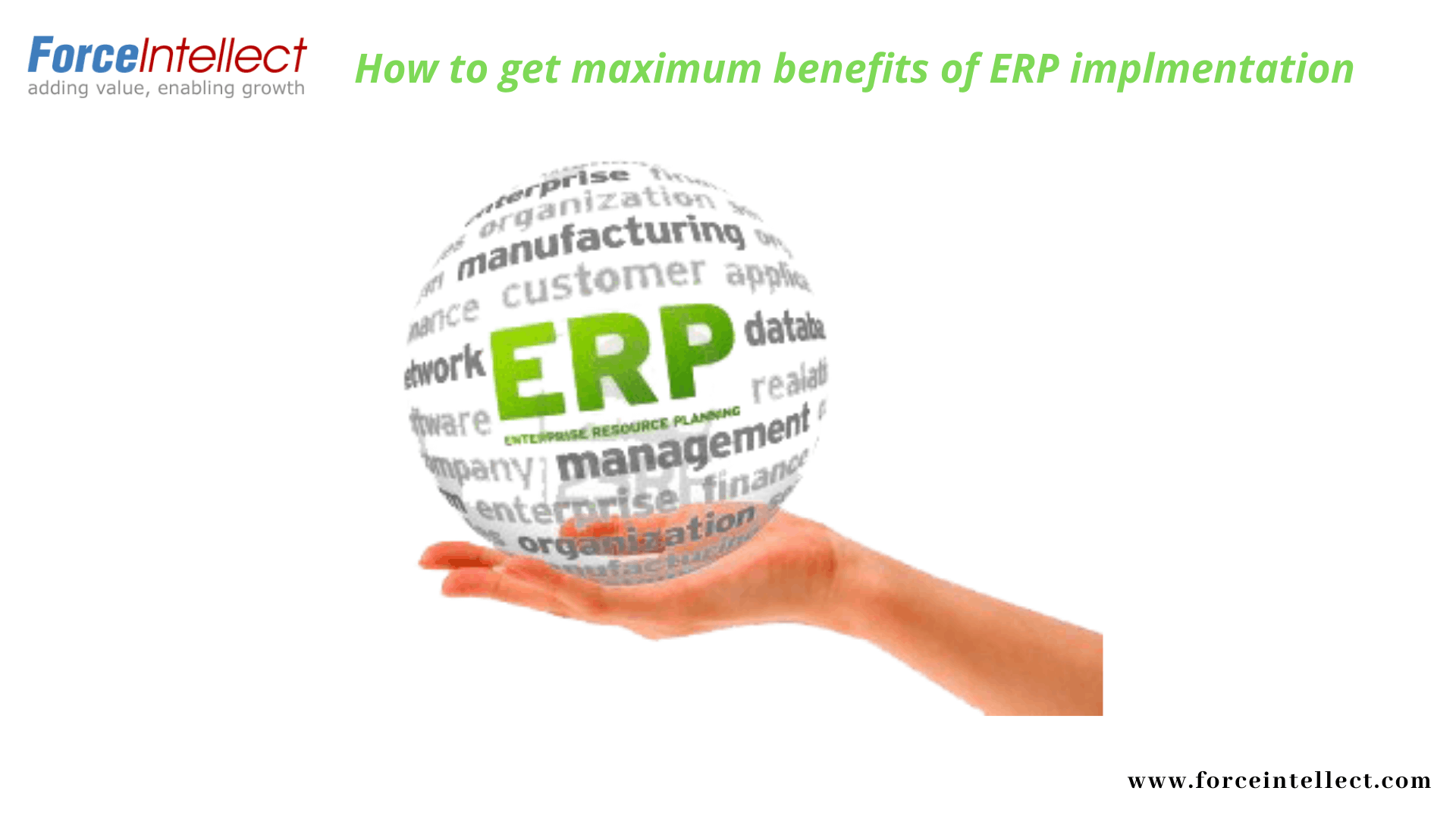
How to get maximum benefits of ERP implementation?
Implementing ERP software is just the first step taken by manufacturing companies to improve current processes and achieve improved efficiency, productivity, and profitability.
Once you have gone through the enormous task of implementing an ERP successfully, it is up to the company, how to reap the utmost benefits of ERP implementation across all processes, functions, departments, locations.
Remember, successful ERP implementation does not transform an organization overnight. Companies that make optimum use of the software are able to rise above the expectations in making their business efficient, productive and agile with the help of ERP.
Let us now discuss, what are the ways and means, to extract the best value from, and gain maximum benefits of ERP implementation
What are the ways to achieve the maximum benefits of ERP implementation?
1. Management should leverage ERP to implement companywide policies
![]() Adopting ERP ensures that companies follow the standard business practices in their industry. With the help of ERP software, you can now, define company-level policies, which have to be followed by all departments, functions, processes. With these, companies can introduce business discipline. With more predictable processes, it will be easier to identify problem areas and take remedial measures quickly.
Adopting ERP ensures that companies follow the standard business practices in their industry. With the help of ERP software, you can now, define company-level policies, which have to be followed by all departments, functions, processes. With these, companies can introduce business discipline. With more predictable processes, it will be easier to identify problem areas and take remedial measures quickly.
E.g. Companies can implement their sales plan policy, budgeting and cost control policies through ERP.
2. Automate tasks to save Precious Time of your employees
 While implementing ERP, the company usually digitizes some manual activities. Continuously working on digitizing, as many manual tasks as possible, will save a significant amount of time spent in doing routine, monotonous work. Employees, will then be able to perform, more strategic work and contribute towards speeding up processes, improving productivity, etc.
While implementing ERP, the company usually digitizes some manual activities. Continuously working on digitizing, as many manual tasks as possible, will save a significant amount of time spent in doing routine, monotonous work. Employees, will then be able to perform, more strategic work and contribute towards speeding up processes, improving productivity, etc.
E.g. Instead of speaking with vendors for delivery, you can set automatic message and email reminders based on certain triggers. Similarly, you can send, follow up messages to customers for payments due, by setting alerts at timely intervals. All other information exchanges such as acknowledging receipts, confirming orders, etc can be done using ERP with minimum human intervention, only when required.
3. Transform Employees from Managers to Leaders
![]() To transform Managers to Leaders, they should be capable of analyzing performance, making informed decisions and so on. For this, they need to have access to the data of their respective departments. With ERP Software, the right data is made available to the right people, based on their roles & designations.
To transform Managers to Leaders, they should be capable of analyzing performance, making informed decisions and so on. For this, they need to have access to the data of their respective departments. With ERP Software, the right data is made available to the right people, based on their roles & designations.
Empower your managers to make informed, timely decisions, to ensure the smooth functioning of the company. This gives them a sense of authority as well as a constant responsibility for contributing to company growth.
E.g.When, Manager-Materials, has access to all the relevant information, he can analyze the consumption trends, incoming trends, lead times, etc. He can leverage his experience and factual data to identify areas for improvement and refine processes.
4. Leverage ERP to build your Corporate IQ
 ERP Software captures real-time and accurate data across the organization, tracks the processes and provides insights and analysis based on the trends, history. ERP provides an analysis of what is working well, what are the problem areas, where delays occur and more.
ERP Software captures real-time and accurate data across the organization, tracks the processes and provides insights and analysis based on the trends, history. ERP provides an analysis of what is working well, what are the problem areas, where delays occur and more.
With the help of this data, gathered over a period of time, it creates a knowledge repository that builds the corporate IQ. Companies have all the data pertaining to projects executed, cycle times, vendors delivery trends, customer requirements, policies which were implemented successfully and so on. This knowledge becomes the basis for making unbiased, fact-based decisions in the future for overall growth and improvement of the company.
5. Use ERP as a tool to transform your business
![]() Companies must use ERP as a tool to focus on continuous improvement of processes, people, products. With accurate data and business insights from ERP, Companies can adopt the PDCA (Plan-DO-Check-Act) method to improve their processes.
Companies must use ERP as a tool to focus on continuous improvement of processes, people, products. With accurate data and business insights from ERP, Companies can adopt the PDCA (Plan-DO-Check-Act) method to improve their processes.
E.g. if your purchase order cycle time is 7 days, check where delay occurs, identify steps to speed up or modify, implement this change, see how it impacts the end result. If results are not better than before, repeat the PDCA process till a positive improvement is achieved.
6. Give Speed to your business
 ERP helps to keep a track of the time spent on activities such as – time to production, time to procure, time to deliver and so on. We have seen earlier how ERP helps an organization save time and improve processes. Right from introducing business discipline, automating tasks, sending alerts, notification for approvals, managing by exception & so on.
ERP helps to keep a track of the time spent on activities such as – time to production, time to procure, time to deliver and so on. We have seen earlier how ERP helps an organization save time and improve processes. Right from introducing business discipline, automating tasks, sending alerts, notification for approvals, managing by exception & so on.
With all this, if you speed up each of your processes by 5% to 10% you will be able to manufacture more products, service more clients in the same amount of time. Achieving Speed will give you a competitive edge and improved profitability.
7. Management by Exception
 With ERP software you can set up rules for various standard processes and an acceptable range of deviation and manage by exceptions. Whenever, there is a deviation, from the standard, ERP will raise a flag and send alert/notification to concerned departments and authorities to take immediate action. This ensures that people follow processes religiously and management is required to get involved only in case of exceptions.
With ERP software you can set up rules for various standard processes and an acceptable range of deviation and manage by exceptions. Whenever, there is a deviation, from the standard, ERP will raise a flag and send alert/notification to concerned departments and authorities to take immediate action. This ensures that people follow processes religiously and management is required to get involved only in case of exceptions.
E.g. Company can pre-define upper limits, for the sales order, purchase order, etc. where no approval is required. Only when the amount is beyond the upper limit, authorization is a must.
If there is a delay in the arrival of critical material, the notification must be sent to relevant people/authorities for immediate, appropriate action.
8. Improve Productivity and Reduce Costs
 With ERP software, companies can also implement Principles for a Lean Enterprise to study current processes, identify problem areas, blockages, wastes and continuously improve processes of manufacturing, production planning, inventory management, procurement, supply chain, logistics. This will improve productivity.
With ERP software, companies can also implement Principles for a Lean Enterprise to study current processes, identify problem areas, blockages, wastes and continuously improve processes of manufacturing, production planning, inventory management, procurement, supply chain, logistics. This will improve productivity.
ERP provides a host of costing and financial reports. Use these insights to keep a close watch on the cost of production per unit. Identify and eliminate unnecessary expenses from all business areas and processes to reduce manufacturing costs and ensure more efficient and profitable business.
Summary
Derive maximum benefits of ERP by making the utmost use of ERP software to streamline and make your business processes more efficient, achieve operational excellence, keep expenses under control and maximize profits.
Request a Demo of Spectrum ERP Software

